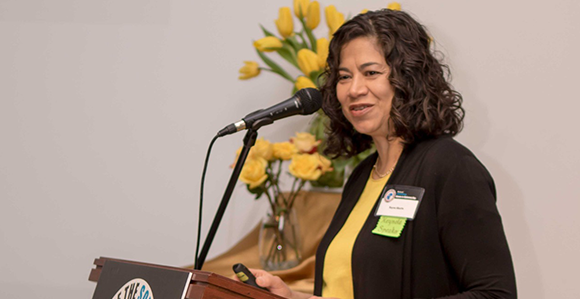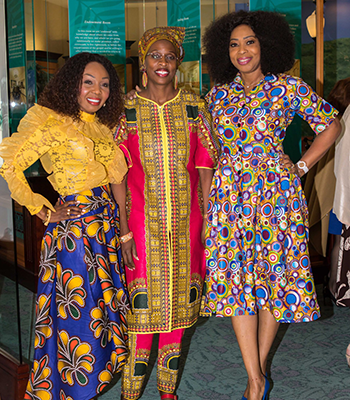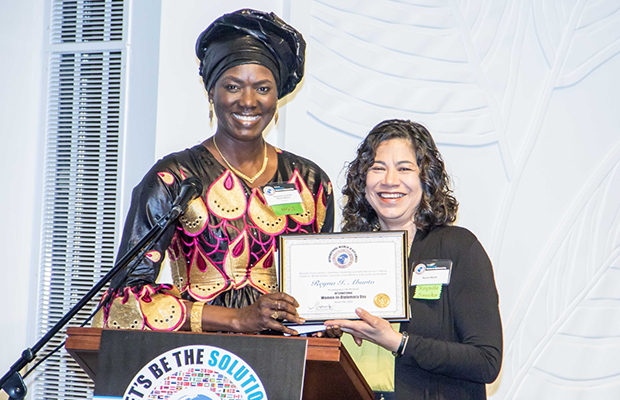Sister Aburto Explains How to Empower Women on International Women-in-Diplomacy Day
Contributed By Aubrey Eyre, Church News staff writer

Sister Reyna I. Aburto, General Relief Society Presidency Second Counselor, delivers the keynote address at the Fourth Annual International Women-in-Diplomacy Day event in Los Angeles, California, on Monday, March 9, 2020. Sister Aburto invited women to “counsel together and find local solutions” to global problems.
Article Highlights
- Women are and can be making a difference in their communities.
- Women are particularly crucial in the solution equation of all social issues because of their influence.
- Women and men must work together to solve problems.
“What can we do to inspire the women and the men around us so they can not only feel empowered to accomplish their own work but also to inspire others to do the same?” —Sister Reyna Isabel Aburto of the Relief Society General Presidency
Related Links
Speaking to a room full of diplomats, professors, CEOs, and other leading women gathered to celebrate International Women’s Day at the fourth annual International Women-in-Diplomacy Day luncheon, Sister Reyna Isabel Aburto stood and asked the attendees to ask themselves this simple question: “What can I do to inspire the women around me so they not only feel empowered to accomplish their own work but also to inspire other women to do the same?”
As the keynote speaker of the event, held at the Los Angeles California Temple Visitors’ Center on Monday, March 9, Sister Aburto joined Mame T. Mbaye, the honorary consul general for Senegal, who hosted the event, and 11 panelists and other leading women to discuss how women are and can be making a difference in their communities.
Sister Aburto, the Second Counselor in the Relief Society General Presidency, began by noting that every community has great challenges it has to deal with. “However, I know that if we strive to tackle them in small and simple ways, little by little, one person at a time, great miracles can occur,” she said.
When women and men work together interdependently to find, identify, and address their challenges, they, as individuals and communities, can create or become the solutions for the problems they see around them, Sister Aburto said.
Amending a quote from Dwight L. Moody about getting a job done, she said, “A great woman is not a woman who does the work of 10 women, but one who is able to inspire 10 women to accomplish their own work.”
So the question becomes not just “What can I do?” but rather “What can we do to inspire the women and the men around us so they can not only feel empowered to accomplish their own work but also to inspire others to do the same?” Sister Aburto said.
Sharing an example of how women and men can work together to address the challenges of their communities, Sister Aburto highlighted the recent work done by Latter-day Saints in the Philippines to address issues of malnutrition among their children.
An important part of the framework for the Church’s pilot nutrition program in the Philippines was allowing families to come up with their own sustainable solutions to the problem.

Attendees pose for a photo during the Fourth Annual International Women-in-Diplomacy Day event in Los Angeles, California, on Monday, March 9, 2020.
Rather than simply seeing the problem and coming in with supplements and an established aid program, the Church asked families and local congregations to identify the root of the nutrition problem with the help of tools and guidance from the local government and UNICEF.
Before long, it became clear that the root problem of the children’s malnutrition was their diet, which did not include sufficient sources of protein, vitamins, and minerals found in meat, beans, fruits, and vegetables, Sister Aburto said.
“They basically had a monochromatic diet. These parents did not know that their children were malnourished,” she said. “They had been feeding them regularly and faithfully, but they were unaware that their precious children were not receiving all the nutrients necessary for them to develop in a healthy way. Besides that, they were unaware of the consequences of the lack of vital nutrients in their children’s diet.”

Attendees pose for a picture at the Fourth Annual International Women-in-Diplomacy Day event in Los Angeles, California, on Monday, March 9, 2020.
By identifying local members who were nurses, doctors, government employees, agricultural experts, and so forth, individuals with necessary experience were able to take on leadership roles and help guide their congregations and communities to begin addressing this problem.
Some communities planted gardens to grow supplemental vegetables to help aid the children’s diets. And almost all the congregations used the system of ministering sisters and brothers to help instruct and check in on families with malnourished children by following up on meal plans to help bring the children up to healthy levels.
“The whole community got together and did something to solve the problem,” Sister Aburto said.
The nutrition program in the Philippines is an example of how simple and local solutions are often the most sustainable and scalable, Sister Aburto said.

Latter-day Saint singer Lexi Walker performs at the Fourth Annual International Women-in-Diplomacy Day event in Los Angeles, California, on Monday, March 9, 2020.
“Inspiring citizens to solve their own problems with a little bit of external help is possible,” she said. “We know that the solution will not be the same everywhere, but we know that the basic principles can apply.”
Once people understand they can be agents of change for their own families and communities, they become motivated to transform their mindsets and environments and make adjustments for the better, she continued. “We all have the ability to act for ourselves and not be acted upon. Knowing that we can make a difference as an individual and as communities gives us the strength and the ability to come up with our own solutions.”
With a focus on preserving the next generation, Sister Aburto said, women are particularly crucial in the “solution equation of all social issues because of the influence that they have in homes, neighborhoods, and societies.”
But in order to preserve the next generation and to give “our children and youth the enlightenment, the resources, the inspiration, the environment, and the skills that they need so they can make of this a better world,” the most important thing that can happen is for men and women to work together, she concluded.
“When human beings put their minds together, their hearts together, their faith together, and their hands together in order to preserve the next generation, miracles happen,” Sister Aburto said. “We have myriads of problems in our communities, but we can be the solution by finding one problem to solve, inspiring others to address it in simple and small ways, and elevating one person at a time.”

Sister Reyna I. Aburto, Second Counselor in the General Relief Society Presidency, is presented with a certificate by Mame Toucouleur Mbaye, the honorary consul of the Republic of Senegal and sponsor of the International Women-in-Diplomacy Day event. The certificate recognized Sister Aburto for her leadership among women and her participation in the event, held in Los Angeles, California, on Monday, March 9, 2020.

Participants in the Fourth Annual International Women-in-Diplomacy Day event pose for a picture at the close of the conference in Los Angeles, California, on Monday, March 9, 2020.
